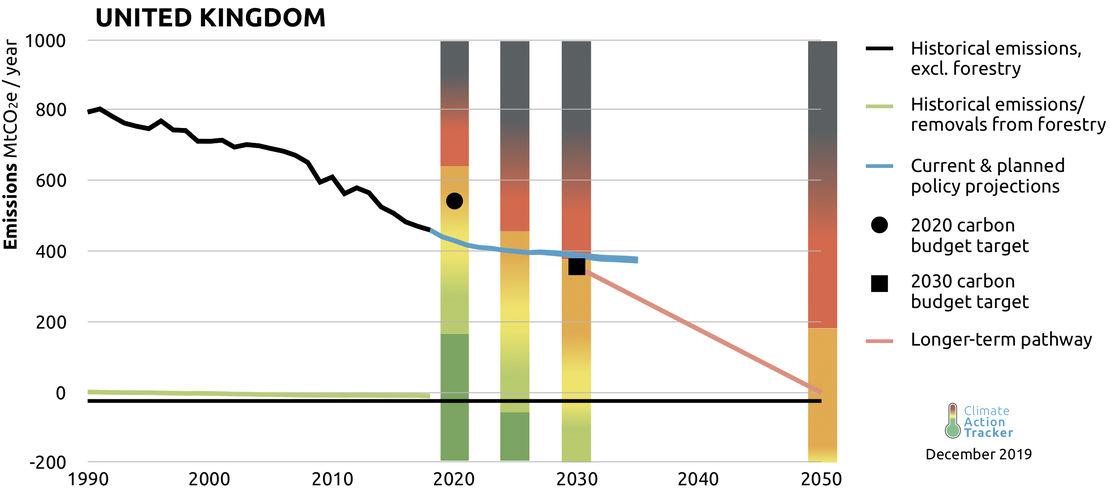Country summary
Overview

The UK is currently projected not to achieve its own medium-term climate targets, with government projections showing it will not achieve the emission reductions required to comply with its fourth (2023-2027) and fifth (2028-2032) carbon budgets.
The significant progress made in the decade since the passage of the UK’s landmark Climate Change Act legislation is expected to stall in the 2020s, vividly demonstrated by the only slight deviation of the planned policy emissions trajectory, from that representing current policies in the graph above. There has been a dearth of new significant climate policies announced in recent years which, if left unaddressed, will leave the UK missing its medium and long-term emission targets. The government must ratchet up its climate policies now to ensure the necessary rapid emission reductions over the following decade.
In the ten years since the passage of the Climate Change Act in 2008, greenhouse gas (GHG) emissions have fallen by 28% and it has provided the foundation for the coordination and advancement of climate action in the UK, including a projected phasing out of coal fired power plants by 2023. The legislation was updated in 2019 to include a net-zero 2050 emissions target, with the UK becoming the first major economy in the world to legislate such a target.
The UK’s five-year carbon budgets, formulated under the original Climate Change Act legislation were originally set in order to comply with the previous 2050 goal of an 80% reduction below 1990 levels. This means the UK’s climate policies will need to be strengthened significantly to ensure the UK meets its long-term net-zero target. The Committee on Climate Change (CCC) did not recommended changes to these budgets, but rather that the government overachieve them. However, the Committee did note it would reconsider whether legislative changes would be necessary to strengthen the fourth and fifth carbon budgets when it delivers its advice on the sixth budget period (2033-2037) in 2020.
The CCC has asserted that net-zero emissions by 2050 constitutes the UK’s ‘highest possible ambition’. It states that Scotland should set a net-zero GHG target of 2045, and that Wales should set a 95% reduction below 1990 levels by 2050 to reflect their respective circumstances. In a review of what will be required to reach the net-zero target, the CCC highlighted the lack of a plan for decarbonising UK heating systems, the lack of progress in developing carbon capture and storage capability, the failure to meet afforestation targets, and that the current 2040 target for banning fossil fuel vehicles is too late.
With a general election scheduled for December 2019, the UK has a chance to decide whether it will match the urgency conveyed by parliament’s declaration of a climate emergency in May 2019 with more ambitious climate policies.
The UK Labour Party has pledged £250 billion to drive its plans for a ‘Green Industrial Revolution’, while recently committing to a 2030 phase out of fossil fuel vehicle sales and £3.6bn for a national charging network. These policies alone would make the UK a climate frontrunner with no other major developed country yet committing to such ambitious actions.
This is in contrast to the Conservative Party which has announced only a limited number of climate-related policies in their election manifesto, including £9.2 billion for improving the energy efficiency of schools, hospitals and homes, and a brought-forward ban on gas-boilers in all new homes from 2020. An announced ban on fracking was subsequently criticised for not being permanent. Many other parties, including the Liberal Democrats, the Scottish National Party, and the Greens, have made action on climate change a high priority in their election campaigns.
As a result of sustained political pressure from the activist group Extinction Rebellion, the UK Parliament decided to establish a ‘citizen’s assembly’ on climate change. This group of 110 citizens representative of the general population will meet over four weekends in early 2020 to discuss what policies they would like to see implemented to reach the UK’s net-zero 2050 emissions target.
Although the UK is set to leave the EU by early 2020, it has committed to continue working with the EU, aligning and, where possible, going beyond the EU’s climate and energy ambitions. The UK’s current targets are more ambitious than what was required under the EU effort sharing legislation, so there is no expectation of a weakening of climate policy ambition as a result of leaving the EU.
The government’s current 2030 target of a 57% reduction in GHG emissions below 1990 levels is rated as ‘Insufficient’, for limiting warming to below 1.5°C. Under the EU’s effort sharing regulation, the UK is expected to reduce GHG emissions that are not covered by the EU emissions trading scheme by 37% below 2005 levels by 2030.


While steep emission reductions have been achieved in the last decade, UK emission reductions are projected to stall in the 2020s. This is primarily because the government has not announced any significant climate policies in recent years. The gap between the current and planned policies emission trajectories in 2030 is a tiny 4 MtCO2e, highlighting the recent policy vacuum. The CCC also pointed out in July 2019 that the policy gap had widened over the previous 12 months, as an increase in the projection of future emissions outweighed the impact of the limited new policies. Of 24 indicators of climate policy progress monitored by the CCC, only seven were on track in 2018.
The UK’s primary policy success in addressing climate change so far has been achieved in the electricity sector, with emissions from this sector more than halving between 2013 and 2018. This has primarily been achieved by shutting down coal-fired power stations and investing heavily in renewable energy technologies. However, with limited coal now left in the electricity system and natural gas use projected to remain substantial in the 2020s, further emission reductions will primarily need to come from other sectors.
The progress so far in transitioning to renewable energy has been encouraging, with the electricity output of renewables in Q3 2019 outpacing the output of all fossil fuels combined for the first time ever. Current policy projections show a further scaling up of renewable energy generation of over 30% by 2030.
The future of offshore wind looks particularly bright, with the government’s 2019 renewable energy auction yielding six new offshore wind farms totalling 5.5GW. The electricity prices confirmed for these projects is below the government’s projected electricity price in 2024/25 and could generate cheaper electricity than existing gas-fired power stations by 2023.
The UK’s scheduled departure from the EU by 2020 creates questions regarding the replacement of the EU emissions trading scheme (ETS) which covers a substantial amount of UK emissions. The UK’s stated preference is for an EU-linked ETS, which would provide consistency and certainty for businesses. Negotiations were ongoing in late 2019 to create such a scheme.
The continued fall in pricing of renewable energy sources underlines outstanding questions as to the future viability of the UK’s nuclear sector, with three planned projects cancelled in late 2018 and early 2019. The projected price of power from future nuclear power plants remains high and the Hinkley Point C plant currently under construction continues to register cost blowouts and delays. A government retreat from nuclear power would require additional investment in renewable energy, and there is considerable anticipation for the government’s upcoming energy white paper scheduled for release in 2020.
A 2040 ban on the sale of fossil-fuel vehicles puts the UK in a small group of countries with such a policy, however the CCC has warned that this date needs to be brought forward, closer to 2030. The slow projected rate of future emission reductions from the transport sector also suggests the government must do more over the short term. A 2018 government decision to cut subsidies for electric vehicles will make such short-term emission reductions more difficult to achieve.
The considerable progress made since 1990 in decarbonising the UK’s industry sector must continue if the UK is to meet its current emission reduction targets. The release in 2017 of eight sector-specific action plans for decarbonising UK industry to 2050 provides a blueprint for doing so. In 2030, industry emissions are projected to be 56% lower than 1990 levels, just under the economy-wide target.
Further analysis
Latest publications
Stay informed
Subscribe to our newsletter




